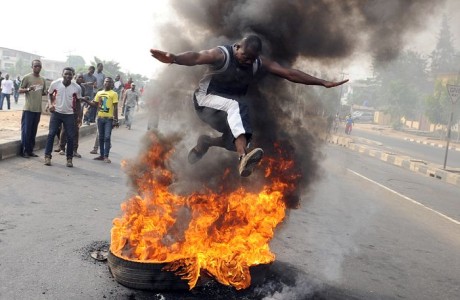The protests came as a nationwide strike virtually shut down the country, though officials said oil production was not affected in Africa’s largest crude producer.
Tensions ran particularly high in Kano, the largest city in Nigeria’s north, when thousands converged on the state governor’s office, prompting police to push them back as they fired tear gas and shot into the air.
Also in Kano, two vans were set ablaze and protesters tried to torch the home of central bank chief Lamido Sanusi but were stopped by police.
A Red Cross official said an initial count showed seven people were being treated for gunshot wounds and seven others suffered a range of other injuries.
Protests appeared mainly peaceful in the economic capital Lagos, the largest city in Africa’s most populous nation, but a union leader accused police of shooting dead a demonstrator there.
Bonfires made of tyres burned along main roads as protesters marched past, with an estimated 10,000 or more converging at a designated location for a rally.
Speakers denouncing the fuel price hike in Lagos included Femi Kuti, son of late musical icon and harsh government critic Fela Kuti, while prominent rights activists also took part.
Protest leaders in Lagoswere keen to avoid provoking police, with tensions running high after authorities were accused of using excessive force against demonstrators last week and shooting dead one person.
While the main group of protesters was largely peaceful, youths on the margins of the march set bonfires and threw bottles. Some yelled “Bad Luck Jonathan,” in reference to President Goodluck Jonathan.
“This is a peaceful demonstration,” said Ishola Adebayo, 38, a teacher who took part in the Lagos march.
“They cannot break our resolve to compel government to drop this anti-people policy.”
Several thousand protesters also attended a rally in the capital Abuja despite massive security.
The strike comes after the government’s deeply controversial move to end fuel subsidies on January 1, which caused petrol prices to more than double in a country where most of the 160 million population lives on less than $2 a day.
Transport costs have followed suit, sharply increasing the price of commuting, and further effects were feared, especially on the cost of food.
The latest unrest comes as security forces are already under heavy pressure over spiralling violence blamed on Islamist group Boko Haram.
Recent deadly attacks on Christians have sparked fears of a wider religious conflict in a country whose population is roughly divided between a mainly Muslim north and predominantly Christian south.
On December 31, Mr Jonathan declared a state of emergency in hard-hit areas, but the violence, including gun and bomb attacks, has only continued and spread to other locations.
Much of the country has been united in anger against the abandoning of fuel subsidies despite a strong push from Mr Jonathan and his respected economic team to make their case for the move.
Nigerians view the subsidies as their only benefit from the nation’s oil wealth and lack any real trust in government after years of deeply rooted corruption.
A court ruling had sought to block Monday’s strike, but it seemed to have had no effect.
The House of Representatives held an emergency session on Sunday and approved a measure calling on the government to reinstate fuel subsidies to allow for further consultations on the issue.
The government however made no sign it would back down.
Mr Jonathan sought to win support for the government’s move in a nationally televised address late on Saturday, but unions rejected it.
The president vowed to reduce salaries for political office holders in the executive branch by 25 per cent as well as to improve public transport, including rail lines, among other areas.
“To save Nigeria, we must all be prepared to make sacrifices,” he said.
Economists say removing fuel subsidies is vital for the country to improve its woefully inadequate infrastructure and ease pressure on its foreign reserves.
The government says it spent more than $8 billion on subsidies in 2011.



